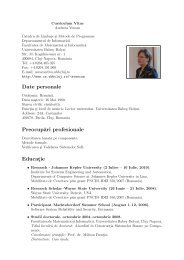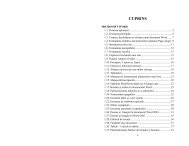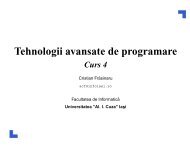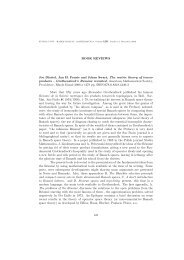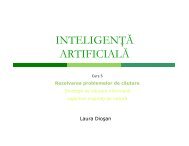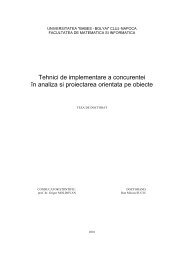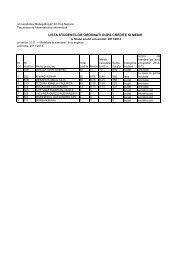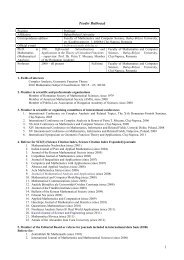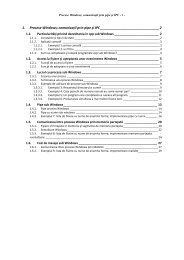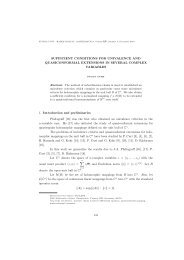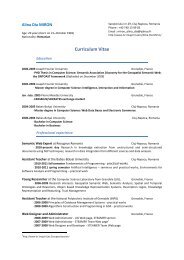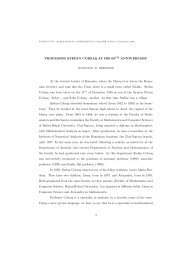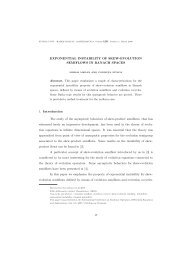CONTENTS
CONTENTS
CONTENTS
You also want an ePaper? Increase the reach of your titles
YUMPU automatically turns print PDFs into web optimized ePapers that Google loves.
KNOWLEDGE ENGINEERING: PRINCIPLES AND TECHNIQUES<br />
Proceedings of the International Conference on Knowledge Engineering,<br />
Principles and Techniques, KEPT2009<br />
Cluj-Napoca (Romania), July 2–4, 2009, pp. 254–257<br />
VIRTUAL REALITY REHABILITATION ENVIRONMENT FOR<br />
OBSESSIVE–COMPULSIVE DISORDER<br />
SORIN JIBOTEAN (1) AND RARES FLORIN BOIAN (2)<br />
Abstract. Medical rehabilitation often employs virtual environments due to<br />
their flexibility, safety and low costs. The applications of virtual reality in rehabilitation<br />
ranges from post-surgery or stroke therapy to ADHD or phobias. The<br />
paper presents a virtual environment developed to train obsessive-compulsive disorder<br />
(OCD) patients to focus on the task at hand without trying to first arrange<br />
everything to a perceived perfect pattern. The application is based on reports<br />
of high school results and exam behavior of otherwise good students who suffer<br />
from OCD.<br />
1. Introduction and Approach<br />
Medical rehabilitation often employs virtual environments due to their flexibility,<br />
safety and low costs. The applications of virtual reality in rehabilitation ranges<br />
from post-surgery or stroke therapy [1] to attention deficit and hyperactivity disorder<br />
(ADHD) [2, 3] or phobias treatments.<br />
Patient suffering of obsessive-compulsive disorder display symptoms such as: fear<br />
of contamination or dirt, having things orderly and symmetrical, or recurrent and<br />
persistent thoughts and impulses [4, 5]. Based on reports from the Pediatric Psychiatric<br />
Hospital in Cluj–Napoca, high school students suffering on OCD, often fail<br />
exams due their focus on arranging things in a perfect pattern instead of focusing on<br />
the test or exam subjects.<br />
The application develop is aimed to training such students to focus on the exam<br />
subjects while ignoring the lack of pattern of the environment. Following the exposure<br />
therapy approach, the virtual reality application, requires the patient to take an exam<br />
in a virtual classroom.<br />
2. Related Work<br />
The applications of virtual reality in the medical field is a very active and extensively<br />
investigates subject. The closest work to that present in this paper has been<br />
done by Rizzo et al. [2] with the Virtual Classroom project for studying ADHD in<br />
children. Their virtual environment places the patient in a classroom and presents<br />
2000 Mathematics Subject Classification. 68U05, 68U35, 68U01.<br />
Key words and phrases. virtual reality, virtual rehabilitation, exposure therapy.<br />
254<br />
c○2009 Babe¸s-Bolyai University, Cluj-Napoca



